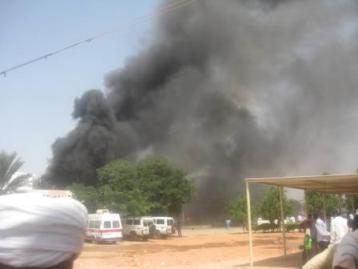Sudan’s NUP condemns wave of assassinations in Darfur
September 21, 2013 (KHARTOUM) -The Sudanese opposition National Umma Party (NUP) has condemned the series of assassinations which took place in Darfur recently and called for bringing perpetrators to justice.

The NUP said in a statement on Saturday that Darfur is witnessing a crisis which represents a serious threat to the national security and lives of people in the region, holding the government responsible for the recent spread of tribal conflicts.
It added that the government is a “key partner” in all tribal conflicts, saying that it divided Darfur region to several states along tribal lines and armed tribal militias under the pretext that it is fighting the rebel groups.
The statement pointed that the wave of assassinations of businessmen, community leaders, and influential figures in Darfur clearly confirms that government does not value human lives, criticizing authorities’ reluctance to capture the perpetrators.
The NUP announced its rejection of government’s strategies and policies in Darfur, denouncing acts of killing and looting carried out by armed militias in the region.
South Darfur State and its capital Nyala, the largest town in the region, have been witnessing a state of security breakdown recently. Incidents of armed robbery have increased and a protests over prices last July saw the authorities killing 13 people most of whom are teenagers.
Last July, deadly clashes erupted between members of security apparatus and a tribal militia which led to the death of First Lieutenant Ammar Anwar al-Haj and police assistant Mohammed Abdullah Sharara who is nicknamed ‘Dekrom’ and also hails from the powerful Rezeigat tribe.
Tribal fighting has become the major source of insecurity in Darfur since the beginning of the year, forcing over 300,000 people to flee their homes.
In a report to the UN Security Council (UNSC), the hybrid African Union-UN peacekeeping mission in Darfur (UNAMID) dedicated three pages to the issue of tribal clashes, which generally erupts over land ownership.
Observers agree that clashes typically occur between tribal groups that in the past fought against rebel forces alongside the government and have strong militias.
Analysts also underline that the emergence of strong militias eroded the authority of tribal leaders as they can no longer challenge the militia chiefs who have money and means provided by the army and security services.
The upsurge of violence in Darfur brings the region back to the fore after its conflict was overshadowed by more recent wars in Sudan’s southern regions of South Kordofan and Blue Nile.
The Doha Peace Document for Darfur (DPPD) which the government signed in mid-July last year with the rebel Liberation and Justice Movement (LJM) is facing difficulties on multiple fronts of its implementation, mainly regarding allocation of financial resources and integration of former rebel fighters into the army.
The DRA was created as part of the DPPD, with the LJM’s leader Tijani al-Sissi its chairman.
(ST)
